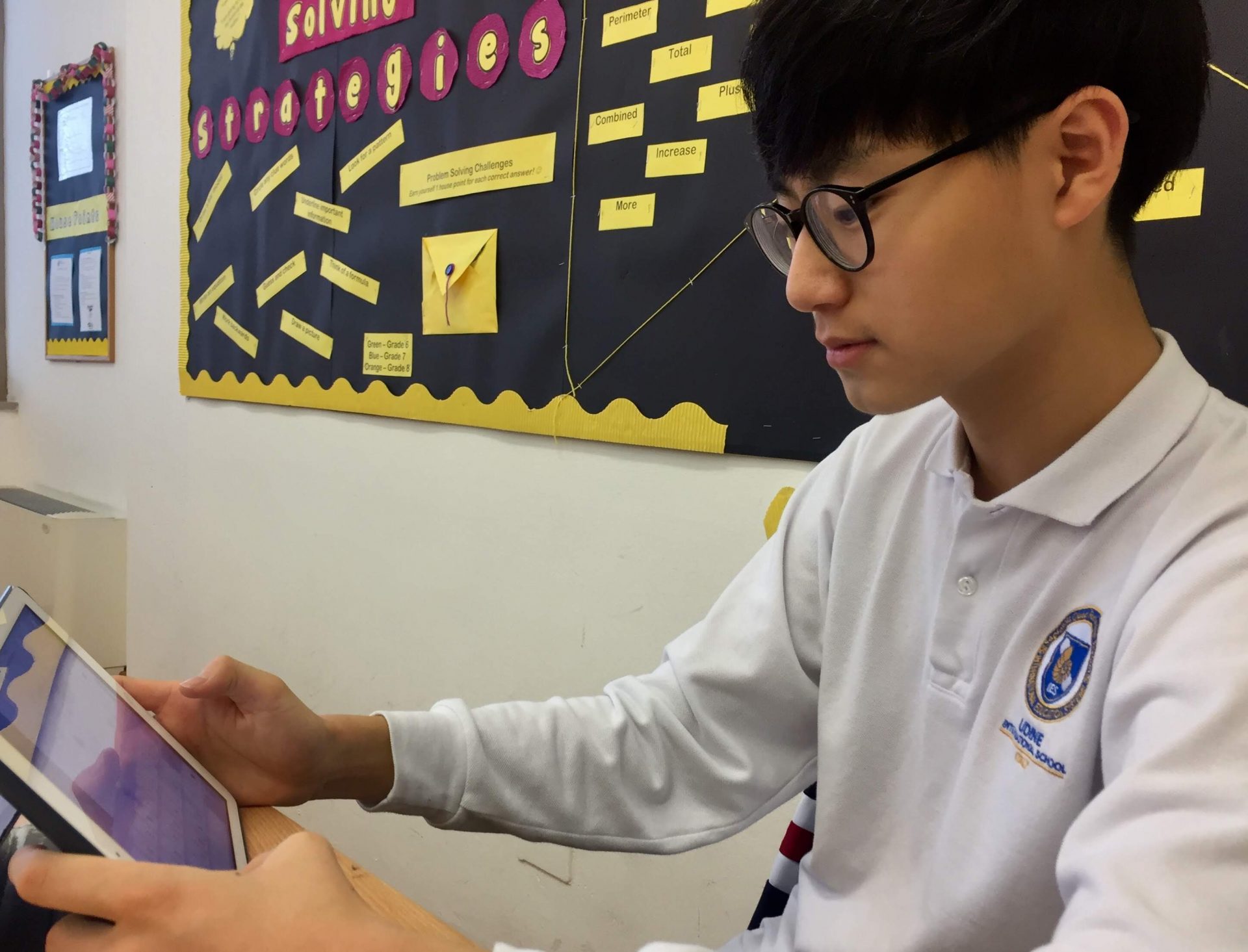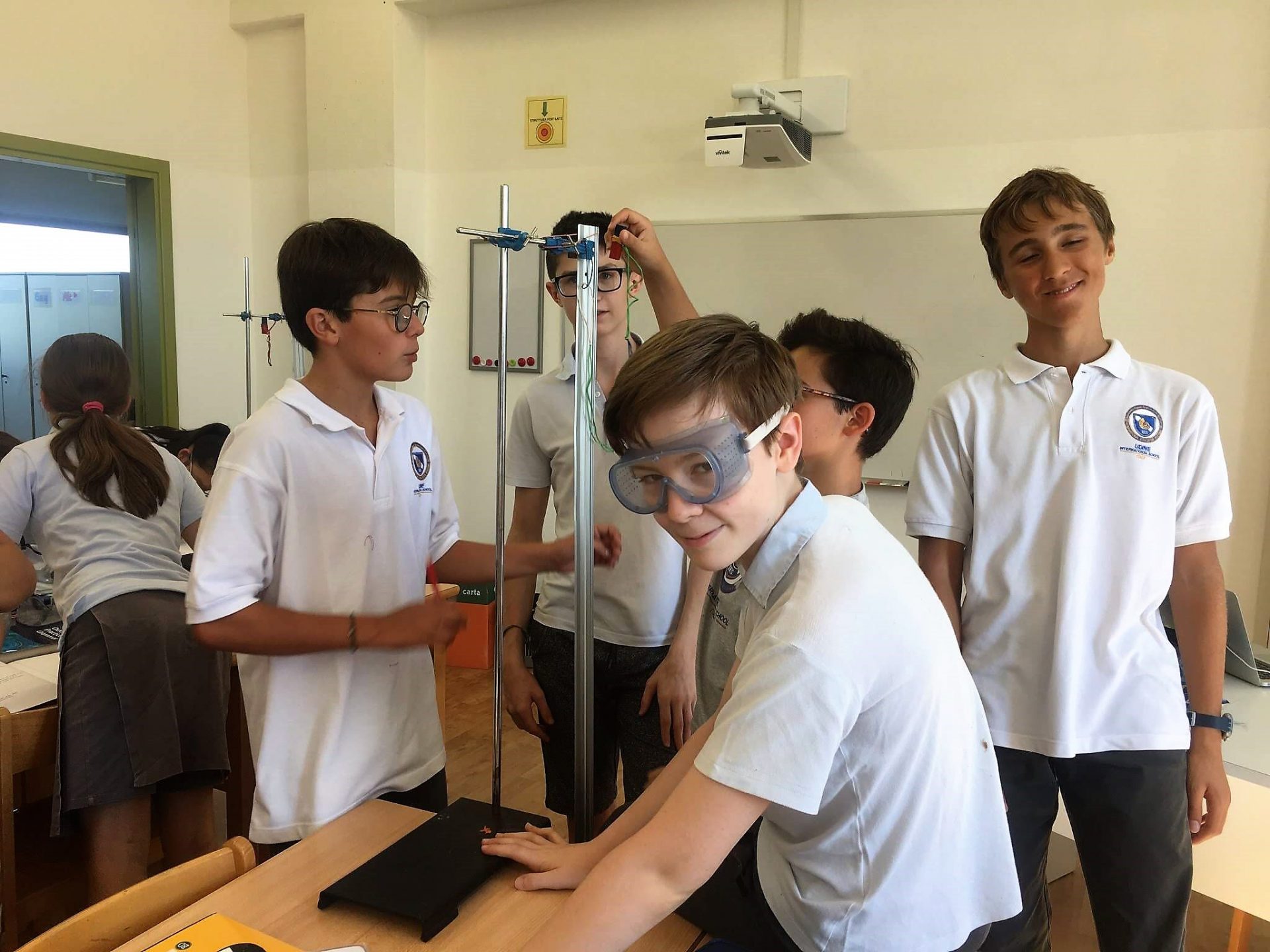
Middle School

The Middle School encompasses Grades 6, 7 & 8. The program concentrates on the acquisition of basic academic skills while also encouraging individual interests, independent thought, global awareness and an enthusiasm for learning. The Middle School is structured with specialised teachers in each subject.
The curriculum is divided into Core Subjects and Additional Subjects.
CORE SUBJECTS
- Language Arts
- Literature
- Social Studies
- Mathematics
- Science
- Italian
- Foreign Language (French/German/Spanish)
- Latin (starting in Grade 7)
Core Subjects are allotted more hours of instruction, pupil achievement in the subject is evaluated and promotion depends on the level of achievement in these subjects (with the exception of Latin).
ADDITIONAL SUBJECTS
- Art
- Physical Education
Additional Subjects are allotted less hours of instruction and are given an effort evaluation, with the exception of Latin which is also evaluated on student achievement.
Students in the Middle School can also participate in a well-rounded program of extra-curricular activities of both an athletic and cultural nature. Field trips are organized within Italy and abroad. These activities are essential for the social, emotional, physical and intellectual development of the student.
Core subjects
LANGUAGE ARTS
The Language Arts program in the Middle School grades follows a language arts and grammar text, supplemented with opportunities for practice, testing, remedial work and enrichment.
The objective of the language program is to develop fluency in the various aspects of the English language – speaking, writing, oral and written comprehension, reading and spelling. A familiarity with and a correct use of basic English grammar is regarded as essential to the acquisition of this fluency. Internet sites are also used to practice Language Arts lessons and communication.
At the end of Grade 8, students can choose to take exams in order to obtain the Cambridge ESOL B2 First Certificate.


LITERATURE
The English Literature program in the Middle School grades follows three literature anthologies with supplements in important British and American Literature. Creative writing (e.g. poetry & essays) and critical appreciation of texts from an integral part of the curriculum.
The objectives of the Middle School literature program are to introduce students to novels, short stories, plays and poetry and instil in them a love for literature. The program also aims at developing the skill of literary analysis as a means of greater literary appreciation as well as the writing of poetry. An essential aspect of the program is analysing, interpreting and evaluating all forms of literature (e.g. poems, novels) using various media and technology.
SOCIAL STUDIES
There are three main aspects to the Social Studies program in the Middle School years. The study of history helps students to develop an understanding of the past, its influence on the present and its implications for the future. The study of geography serves to create an understanding of the relationship of people with their environment, a sense of place, and a sense of self in relation to personal, local, national and international location. Finally, by incorporating elements of sociology, anthropology, economics, ethics and politics students will concentrate on the study of human relations between individual groups and societies and how their values shape our social systems. The main concepts focused on are interdependence, change, scarcity, conflict and culture. Students will develop research, thinking, social participation and orientation skills.


MATHEMATICS
The Mathematics program develops individuals who can think critically about complex issues, solve multi-faceted problems, adapt to new situations, effectively communicate their thinking processes and build on their Mathematics studies in Elementary School. The main objective in Mathematics is to provide students with the framework needed to meet these goals, leading to the mastery of skills in mathematical structures, operations and thought processes, promoting logical reasoning, practical problem solving and related technological skills. Students are encouraged to explore mathematical phenomena in concrete “real life” activities, to identify relationships between these and everyday situations and to use acquired concepts and skills to extend thinking in other subject areas. Primary areas of focus are Number Sense, Logical Reasoning and Problem Solving, Measurement, Geometry, Statistics, Data Analysis and Probability, Algebra and Functions. Students are guided in their learning from concrete experiences to pictorial representation and finally to abstract concept representation, as in the world-recognised Singapore Mathematics method.
SCIENCE
Students use their scientific knowledge, curiosity and intuition to test and confirm their understandings and to investigate the world. They understand that Science is a body of knowledge, developed through human observations and inferences that may reflect diverse values and beliefs, understanding that scientific knowledge is dynamic and that theories are reviewed in the light of new evidence. Students also understand that Science is a way of thinking and working and that they apply their scientific knowledge to make responsible and informed decisions about real-world issues.
Students will develop skills to:
- evaluate contributions to the development of scientific ideas made by individuals and groups in the past and present, and consider factors that have assisted or hindered them;
- use scientific ideas about the Earth and the components of the universe to explain how events over time and in space can lead to catastrophic changes;
- evaluate the immediate and long-term consequences of different ways of obtaining and using energy;
- use scientific ideas (including concepts of genetics and natural selection) to explain how variation in living things leads to change in species over time;
- describe the structure of properties of matter using models of atoms and molecules.


ITALIAN
The Italian programme in the Middle School is a follow-up to the programme started in the Elementary School and is aimed at consolidating the development of spoken and written language skills.
The continuity of the Italian programme is a major objective at The Udine International School since it is a continuous path, beginning in Grade 1 and ending in Grade 8. Programmes follow the provisions and guidelines of the Italian Ministry of Education, Universities and Research (MIUR).
The programme pays maximum attention to essential objectives, thus ensuring that a student who does not attend the entire international school cycle can continue his/her studies in any Italian school, whether public or private. At the end of the programme, all students will be able to use oral and written language in all its forms, employing correct and expressive reading skills using proper pronunciation and be able to write different textual types without mistakes (narrative, descriptive, argumentative, expository texts etc.) respecting morphosyntactic, lexical and spelling rules. Texts aim to show coherence and consistency and will be tailored to their purpose and recipients. (For further information consult “Program of Studies & Parent-Student Handbook” in the “Information Section”).
Throughout the school year, the school organises several fields trips to museums, theatres, exhibitions, libraries, art galleries, historical and archaeological sites, all in connection with the school curriculum.
FOREIGN LANGUAGE
Spanish and German are the Core Foreign Language options and will always be available to our Middle School students.
Foreign languages are studied starting from an English base, thus consolidating grammar acquisition in both languages, and gradually the lessons are entirely taught in the target language.
The main objective of the three-year course is to acquire a solid fundamental knowledge of the language as a means of communication by stressing speaking, listening, writing and reading skills. The student will gradually increase their ability to express themseves using the most common polite phrases and exchanges of information. Attention is given to the phonetic, lexical and grammatical areas of the language to develop confidence in speaking and writing.
The program uses core textbooks and supplementary reading materials, audio materials and audio-visual materials, as well as online resources. At a more advanced level, students engage in conversations, dialogues, debates or the discussion of ideas from their personal and social life. The foreign language culture, lifestyle, as well as some history and geography, will be introduced.
At the end of Grade 8, students can choose to take exams to obtain the following Common European Framework certificates:
GERMAN – KID A2 (Zertifikat Kompetenz in Deutsch).
SPANISH – DELE A2 (Diploma de Español como Lengua Extranjera).
The certification exams are not mandatory.


LATIN
The Latin program is aimed at giving students a solid basis to continue the study of this subject in High School. Latin is allotted two lessons per week starting from Grade 7.
The main goal of the program is to give students a clear understanding of the phonetics and syntax of the simple sentence. Students will study and analyse various aspects of the Latin civilisation in Ancient Rome from a historical as well as literary point of view. Major authors of the Latin language, such as Ovid, Seneca and Cicero, Catullo will be introduced and passages of their writing translated into Italian.
Additional subjects
ART
The Middle School program continues a more in-depth study of the language of art begun in Elementary School: the elements (lines, shapes, tone, colour and texture) and the principles of drawing (rhythm, balance, harmony, unity, contrast). Students will continue more advanced forms of drawing, painting and sculpture. Elements of design and technology are introduced, along with Art history are integral to the curriculum. The combination of practical studio work linked with art history consolidates the student’s ability to create and appreciate art.


PHYSICAL EDUCATION
During the Middle School years, group interaction is a significant part of growing up. With this concept in mind, the program is designed to stress group participation. Emphasis is placed on team games and the learning of team strategies. Being a member of a team is extremely important to the adolescent. While many students may never again participate in team activities, these activities are nonetheless an essential part of an adolescent’s social development. Active participation is stressed, and student evaluation is based more on effort and attitude rather than on individual ability. Nonetheless, excellence is encouraged, and students are given ample opportunity to try traditional local sports (Football, Basketball and Handball), and more importantly, an emphasis is placed on less conventional international sports (Cricket, Tag Rugby, Cope Ball etc.) where rules, customs and skills are taught.






